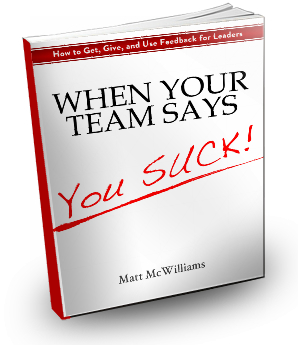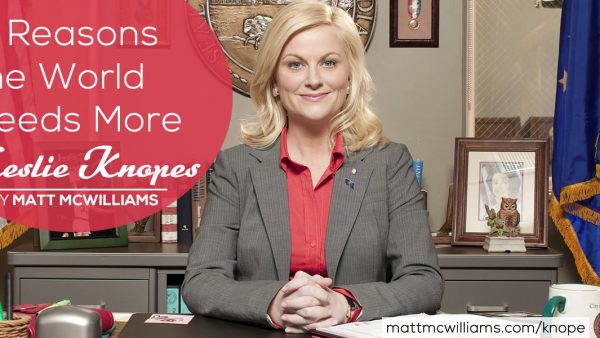For some leaders, every mistake is life or death, or so it seems.

As a small business owner and having worked with numerous companies with 50 or less employees, no one has ever accused me of under-reacting to mistakes by my teams. In fact, when I first started as a leader, the “Wrath of Matt” was a part of company lore.
In short, I was an idiot.
Small business mistakes
It’s most prevalent in the small business world, where small mistakes can literally put an infant company out of business. The owner has toiled and sweat and worked insane hours for a year or two developing his baby. He has brought his idea to fruition and been involved in every aspect of its development. Suddenly he brings someone else on board, who has neither the emotional connection to the product nor an intimate knowledge of every moving part. And he expects perfection. Sure, that’s reasonable.
And what happens?
Chaos. Total chaos. At least in the owner’s mind.
Mistakes are made. Fundamental mistakes. Perfection, once thought to be possible, is now impossible. People take sick days. People come to work tired. People screw it all up.
That’s what seems to happen.
In the small business world, this leads to irrational decisions like:
- Firing people too quickly.
- Not hiring more people when they are needed.
- Flying off your handle.
- Just “doing it yourself.”
Corporate mistakes
The same problems occur in big businesses. But the overreactions are usually handled by HR or legal.
When a mistake happens in large bureaucracies we see:
- Corporate memos.
- New policies.
- Training for the entire staff or team.
- Cover-ups by the mistake-maker and/or boss.

How to stop overreacting
The key for me as I evolved as a leader was realizing this:
Permission to make mistakes enables high performance.
Mistake-free environments are stagnant or dead. (Click to Tweet)
How can leaders affirm individuals while dealing with mistakes?
Realizing that every mistake contains at least some small success. No one has ever completely screwed up an entire project. They always did something right. I tried to focus on that to start and then focus on areas of improvement.
It was so hard for me at first because projects done 25% right were done 75% wrong. They usually weren’t any better than projects not done at all and were sometimes worse. Sometimes mistakes cost tens, even hundreds, of thousands of dollars. Mistakes were painful. They meant no paycheck that month.
But I had to get over the pain and focus on the future development of my team.
Mistakes can only lead to two things:
- Fire them for incompetence.
- Learn from it.
You can’t hold a grudge. You either need to replace the person or decide that they hold long-term value and help them learn from it. That starts with recognizing what they did right.
6 ways great leaders handle mistakes
- Small mistake = small reaction.
- They take their time. The easiest way to not overreact is to not react quickly.
- Isolated mistakes = isolated response. One person’s mistake is not a justification for a company-wide meeting.
- They acknowledge the positive. This is not a clever technique to disguise a mistake. But great leaders realize that something was done right and share that.
- They focus on the future. It might feel better to focus on the past and get out your anger, but it will do you no good. Great leaders keep their mind and their speech focused on corrective action.
- They involve the mistake-maker in the solution. Great leaders say “Let’s figure out a way together to keep this from happening again.
How have you seen great leaders respond to mistakes? How have you responded?
Questions?
Text me anytime at (260) 217-4619.
Or…check out some of my free reports to help you get on the right track:
 |
 |
 |
 |
 |
 |
 |
 |
 |





Sometimes I feel like I do this more at home than at the office. My daughter spills the dog food on the floor, and I go crazy. I need this reminder (probably daily) in my life to make sure my reactions match the infractions. I need to remember the words of James…be quick to listen, slow to speak, and slow to become angry.
Oh, I hear you Jon. Loud and clear. I’m guilty of this too often.
I think also that great leaders separate the behavior from the person, they admonish in private, build the person up by helping them be aware of how the mistake can be corrected and prevent future ones. They don’t dwell on the issue and/or bring it up every possible time. They watch their language and don’t let anger drive their message. Thanks for a post that has reminded me on what I need to work on with my team and my family.
Well said Lily.
To piggyback on your comment, great leaders avoid the fallacy of thinking everything they do wrong is a mistake and everything someone else does wrong is a fundamental breakdown in character.
Michael Hyatt has a podcast on what to do when things go wrong. From what I learned there, here is #3 for “Mistakes Can Only Lead to Two Things” – figure out what is possible BECAUSE the mistake happened.
Great addition Jana!
Thanks, Matt. This is such a radical change from my regular way of thinking that I had to really work to remember what Michael’s point was.
So, putting it into practice: because I have fewer drawing students than before, I now have more time at home in the studio and am able to give much more to the students I have. (One will be having her first art show in July!!)
And please forgive me for turning the corner from Mistakes to Bad Things. It seemed relevant at the time. . .
Reminds me of the old quote: “Even if you fall on your face, you are moving forward.” I don’t remember who wrote it – but I always found it funny yet true. I thing mistakes in the workplace can be viewed like that most times.
I like it. Albeit painfully moving forward 🙂
I like your comment that even in our mistakes there is an element of success. I’ve grown more wise and patient over the years, but have been know to react too quickly to mistakes.
And even if nothing was done right, it usually provides opportunities and brings up things that were not possible, so there is always a positive.
Tech guy screws up code = chance for customer service to interact with customers. Hey, there is a silver lining.
Never though of it that way, I´d probably be the one who automatically fires the person since it´s what I´ve learned as an employee. The other thing is that this example you can use it in everyday life. Ex. A friend supposed to take me to a job interview(I don´t have a car he does) so he agrees to be at my house by 7a.m he doesn´t show up until 8 a.m. I´m mad to say the least havn´t been unemployed now for over a year(this is my exclusive job for now, blog and writing). I can focus on the other times over the years that he hasn´t let me down or this one, one big one and not talk to the guy in my life. Which it only will create resentment on my part and that is not a good trait to have. So I´ll probably give him a call one of these days.